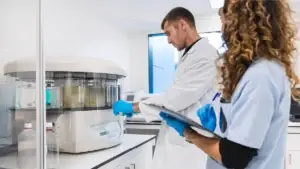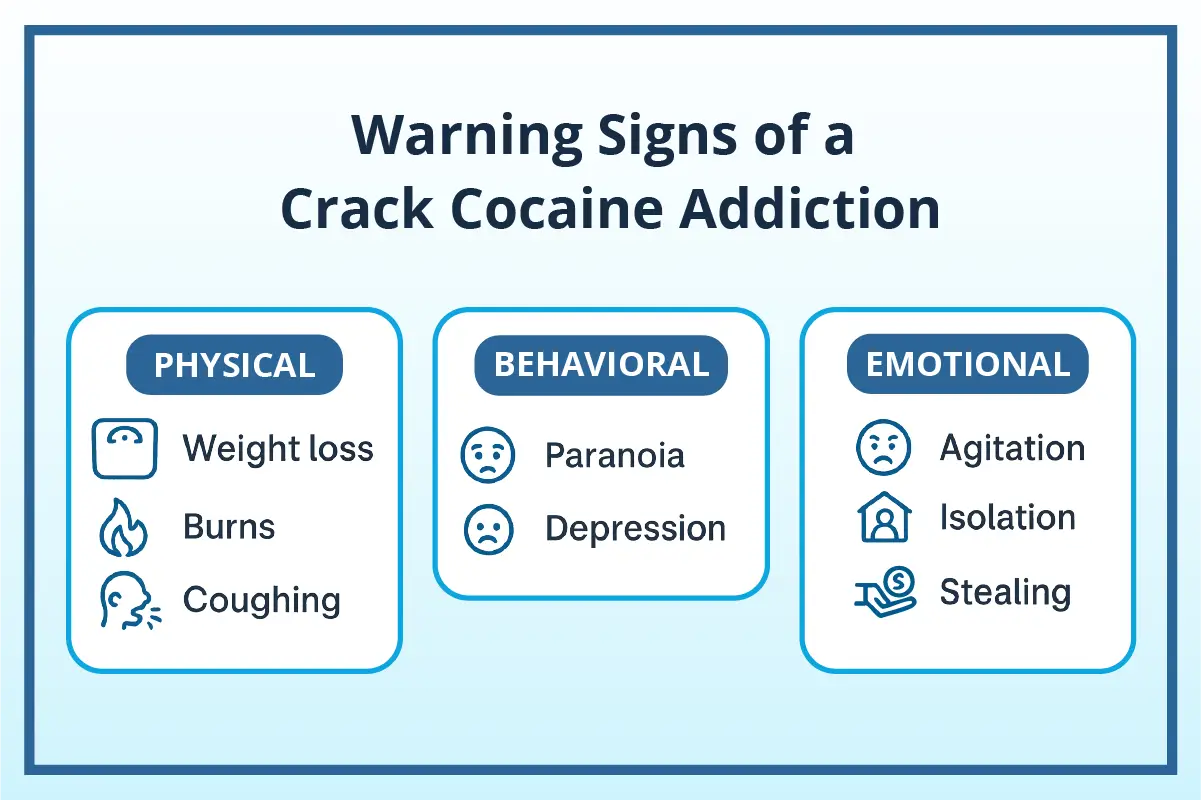

Dr. Rostislav Ignatov, MD
Chief Medical Officer
Crack cocaine is a fast-acting stimulant drug that delivers a short but powerful high. The effects come on within seconds but fade quickly, often leading users to take hit after hit in rapid succession. Over time, this intense cycle of highs and crashes can spiral into a full-blown addiction.
As one of the most addictive and dangerous drugs in the U.S., crack cocaine doesn’t discriminate. It affects people from all backgrounds—across ages, communities, and income levels. Understanding how crack impacts the brain and body is crucial. It can help you recognize when it’s time to seek help and why getting the right addiction treatment can lead to real, lasting recovery.
Crack is a potent, smokable form of cocaine that has been processed with baking soda or ammonia to create solid “rocks.” These are typically heated in a glass pipe, producing vapors that are inhaled directly into the lungs. From there, the drug reaches the brain in seconds—faster than snorting or injecting cocaine—and produces an intense, euphoric high.
Because the high from crack is so short-lived, it often lasts just 5 to 10 minutes. Users may feel an immediate urge to smoke more. This compulsive pattern of binging to chase the high can quickly lead to dependency.
Crack is most often used by:
What makes crack so dangerous isn’t just how fast it works. It’s how quickly it rewires the brain’s reward system. People can become addicted after just a few uses, with cravings becoming more intense and frequent as tolerance builds.

The sooner these signs are recognized, the better the chances of intervening before long-term damage occurs. Crack addiction doesn’t resolve on its own. But with the right support, recovery is possible.
Crack cocaine can cause paranoia, overdose, brain damage, and lung failure.
Crack cocaine can seriously damage the brain and body, often after just a few uses. Without treatment, these effects tend to get worse over time.
Because of its powerful stimulant effects, crack puts tremendous strain on the heart and central nervous system. Raising the risk of sudden death even in young, otherwise healthy individuals.
Getting addiction treatment for crack cocaine addiction isn’t just about stopping drug use—it’s about creating the foundation for a healthier, more stable life.
As the body begins to heal, many people notice improvements in how they feel and function. Sleep improves, energy returns, and thinking becomes clearer.
With support, the intense emotional highs and lows of addiction begin to level out, and day-to-day life becomes more manageable.
Beyond the physical changes, treatment also creates space for emotional healing and personal growth. It helps individuals reconnect with themselves and those around them, often repairing damage that addiction left behind.
Treatment for crack cocaine addiction works best when it addresses both physical dependence and the underlying emotional or psychological issues.
Treatment plans for crack addiction may include:
Choosing recovery is one of the most powerful decisions you can make, but you don’t have to do it alone. At The Haven Detox, we meet you with compassion, expertise, and a clear plan to help you heal.
From medical detox to long-term aftercare, our team provides evidence-based treatment designed to support you at every stage. We offer residential programs, outpatient services, and dual diagnosis care to treat the whole person—not just the addiction.
Whether you’re facing crack cocaine addiction, another substance use disorder, or co-occurring mental health challenges, we’re here to help you take back your life.
Don’t wait for things to get worse. Call The Haven Detox today to learn how we can help you or your loved one start the journey toward lasting change.
Get answers about your cost / coverage now.
Your information will be kept private
Let’s talk about what’s going on — no judgment. (We’ve been there before ourselves). No one will know you inquired and there is no commitment to call.
24/7 Support
No Commitment
100% Private
There’s no catch. Checking your insurance is simply a way to see what your plan covers — it doesn’t lock you into treatment, notify anyone, or cost you anything. You get answers upfront to decide what makes sense for you.
Protecting your privacy matters! No information or notifications are ever sent to your employer or family — whether you check your insurance online or call. Everything is handled through secure, encrypted systems that meet strict medical privacy laws. You stay in control of your information!
Luckily, most insurance policies cover treatment here. Depending on the healthcare you’ve already had this year, costs could even be zero. Instead of worrying, let’s just find out what your plan covers.
Most likely. We work with major providers like Cigna, Aetna, and United Healthcare, public insurances like Tricare and tribal plans, and even smaller plans like Surest Bind and Harvard Pilgrim. The quickest way to know for sure is to check online or call. It’s a quick, private way to understand what is covered upfront.
Verifying your insurance isn’t a commitment to start treatment — it’s simply a way to see what your options are. Knowing your coverage ahead of time helps you make more informed, confident decisions. It also helps flag a spot, so you’re able to get right in if you ever do decide you’re ready.
You need your policy number to check your specific policy online. If you want general information, just call. You likely have questions beyond insurance anyway. Reaching out now helps you figure out the right fit if or when you’re ready. You don’t have to put off the call until you’re in crisis. Calling is not scary, I promise!